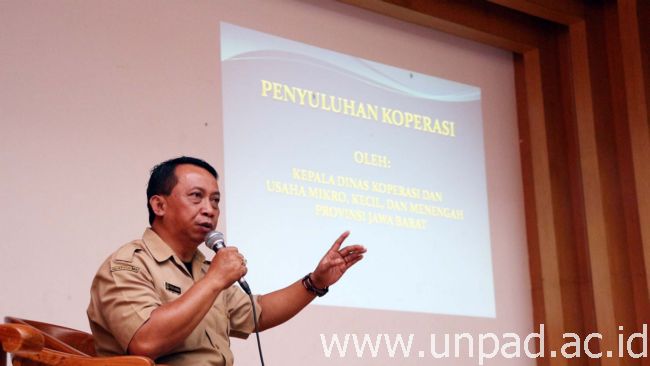[Unpad.ac.id, 12/07/2016] Development of Cooperative in university is necessary because cooperatives run by universities are considered to represent a space of improvement and development of small and medium businesses in the community. In addition, cooperatives in universities should be actively managed and sustainable.

Section Chief of Cooperative Counseling Board of Cooperative and Small Medium Enterprises (KUKM) West Java Province, Drs. Otong Hardadi, said that cooperatives formed in university should be able to unify the four pillars. These four pillars are independence, association, forum for the development of “research & development” university, and integration with the city/regency/province.
“Do not let cooperatives formed only for its name, without any activity,” said Otong during the cooperative counseling in Bale Rumawat Unpad, Jln. Dipati Ukur No. 35, Bandung, Tuesday (12/07).
Otong explained that since cooperative was built on consolidation between academics, employees, students, alumni, and the community, the university cooperative should able to provide assistance for people and businesses. The mentoring included provision of recommendations for business development to then actively participate in the welfare of its members.
Furthermore Otong believed that the main factor for well cooperative management was the active participation of its members. Member has a strategic role in the management of cooperatives, as both owner and user of cooperative services. Thus, the coordination of the members of the cooperative is not only done in the initial management, but should continue to be sustainable.
“The key to the cooperative management of is the similarity of opinions and thoughts of the members of the cooperative,” Otong explained.
In addition to members’ active participation, university cooperative should also have comprehensible business field. Businesses that are developed should also have comprehensible audience. For developed business sector, Otong argued, university cooperative had at least one major business areas as well as an additional one that engaged in services.
“The running business should at least be capable to cover of its members as much as 85%,” said Otong.
In this case, university cooperative can also conduct certification of micro enterprises run by its members. Otong said that this certification is important so that members’ businesses can be run optimally. “It could also be a medium for the three responsibilities of Higher Education,” added Otong.
Another emphasize is to work with stakeholders. This cooperation aimed to further develop the business carried on by the Cooperative.
With focusing on the three aspects of management, Otong hoped that university Cooperative is not limited in stagnant or inactive management.
Unpad has prepared to set up a cooperative whose members consist of faculty, staff, students, to alumni. It is planned that the name of the cooperative is taken from a line in Unpad Hymn, namely Insan Abdi Masyarakat Cooperative.*
Reported by Arief Maulana / eh
